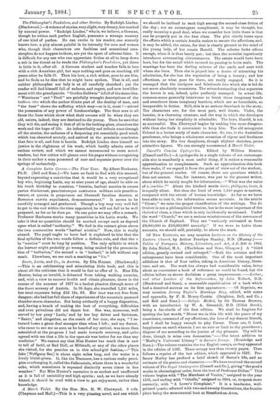Of NEW EDITIONS, we may mention Lectures on the History
of the Eastern Church, by Arthur Penrhyn Stanley, D.D. (Murray.)— Tables of European History, Literature, and Art, A.D. 200 to 1882. By John Nichol, M.A. (Maclehose and Sons, Glasgow.) A "third edition, greatly revised and enlarged."—Both the revision and the enlargement have been considerable. One of the most important additions is that of four tables, taking in American history, litera- ture, and art. The work has always had considerable value, being about as convenient a book of reference as could be found, but the edition before us shows doubtless a great improvement.—Luther, and other Leaders of the Reforntation, by John Tullocb, D.D. (Blackwood and Sons), a seasonable republication of a book which had a deserved success on its first appearance.—Of Reprints, we may mention Jeremy Taylor's Marriage Ring, edited, with notes and appendix, by F. B. Money-Coutts. (Deighton, Bell, and Co. ; and Bell and Sous.)—Religio Medici, by Sir Thomas Browne, with an introduction by W. A. Greenhill, M.D. (Elliot Stock), being a fac-simile of the first edition. We shall be forgiven for quoting the last words, " Bless° me in this life with the peace of my conscience, command of my affections, the love of my dearest friends, and I shall be happy enough to pity Cresar. These are, 0 Lord, happinesse on earth wherein I set no rule or limit to thy providence ; dispose of me according to the justice of thy pleasure. Thy will be done, though in mine own damnation."—The latest addition to " Morley's Universal Library" is Bacon's Essays. (Routledge and Sons.)—The volume contains the ten English essays, as they appeared in the edition of 1597. These occupy less than twenty pages. Than follows a reprint of the last edition, which appeared in 1527. Pro- fessor Morley has prefixed a brief &reach of Bacon's life, and an estimate of his genius and character.—We have received the second volume of The Royal Shakespeare (Cassell and Co.), giving" the poet's works in chronological order, from the text of Professor Delius." This volume begins with "The Merchant of Venice," assigned to the year 1595, and ending with "Othello," assigned to 1604, or, to speak more correctly, with "A Lover's Complaint." It is a handsome, well- printed quarto, adorned with two-and-twenty illustrations, the frontis- piece being the monumental bust at Stratford-on-Avon.






































 Previous page
Previous page